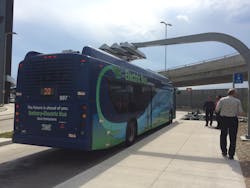The Canadian Urban Transit Research and Innovation Consortium is leading a demonstration project that currently has three participating municipalities in two provinces.
CUTRIC’s Pan-Canadian Electric Bus Demonstration and Integration Trial has brought together funding partners, research teams, technology tools and manufacturing stakeholders with champion transit systems to lead the world’s first multi-manufacturer e-bus technology demonstration trial. As part of this project, at least 20 electric buses supplied by New Flyer Industries and Nova Bus Inc., along with seven overhead chargers supplied by ABB Group and Siemens, will demonstrate the interoperability of the OppCharge protocol designed by Volvo.
TransLink in Vancouver will be the launch agency for this trial with the deployment of four e-buses and two overhead chargers on one of the region’s busiest regional transit routes in the second half of 2018. A total of 16 e-buses and with five overhead chargers will launch in Brampton and York Region in Ontario. TransLink will be the first to procure and receive their buses and chargers, the first of the three agencies to launch the vehicles in service, with Brampton and York following in Ontario. Brampton will lead with the largest fleet deployment, which is a national first. And York Region will lead as the first transit agency to have a hydro company own and operate the charging system for electric buses.
“CUTRIC’s job is to foster innovation in Canada and support job growth in the low-carbon and zero-emissions transportation industries,” said CUTRIC Executive Director & CEO Josipa Petrunic. “These projects are crucial for advancing the commercialization of zero-emissions vehicles (ZEVs) and providing Canadian and international companies and our transit agencies with the opportunity to develop world-class intellectual property in Canada. The project also supports Canada's climate change commitments with the goal of displacing diesel technologies with lower carbon electric propulsion technologies.”
Brampton, Ontario
Brampton City Council approved project funding in March 2017 making Brampton Transit the first municipality in the world to approve funding for an electric bus trial focused on multi-manufacturer interoperability.
“This milestone marks the first time competitive bus manufacturers and competitive charging station manufacturers are designing and delivering interoperable charging systems to make electric transit planning easier for transit agencies,” said Petrunic. “There is nowhere else in the world where this type of collaboration is in place.”
The city of Brampton will deploy up to 10 electric buses and four overhead electric charging stations that plug into an open protocol known as the OppCharge protocol — first jointly developed by Siemens and Volvo Bus Corp. The protocol standardizes the design of the robotic off-board pantograph that connects the charging station to the bus, communications between the bus and the charger, and performance metrics of the overall system.
Regional Municipality of York, Ontario
The Regional Municipality of York also approved project funding in March 2017, incorporating six fully electric transit buses with one overhead charger in the town of Newmarket, Ontario in partnership with Newmarket-Tay Power Distribution Limited. The unique collaboration between York Region Transit and NTPDL makes York Region the first municipality in the world to have a utility own and operate an overhead e-bus charging system to power the transit vehicles.
“Newmarket-Tay Power’s inter-agency cooperation with the town of Newmarket and York Region Transit will support the Ontario government’s Climate Change Action Plan. Equally important, it will support the government’s goals in electricity conservation through electricity load management that integrates the principles of electric vehicle charging, battery storage and distributed generation,” said Paul Ferguson, President, Newmarket-Tay Power.
“The York Region project places utilities at the forefront of electrified transportation, and demonstrates what we have all wanted to see for several years — a more proactive role by Ontario’s local distribution companies in supporting electric vehicle integration,” said Petrunic.
The project is designed to actively support York Region’s larger regional goal of achieving zero greenhouse gas emissions by 2051.
Vancouver, British Columbia
In early 2017, Vancouver’s TransLink joined the national trial to become the third transit agency approving funding for an on-road long-term interoperable e-bus demonstration project. The Metro Vancouver Board of Directors approved almost $7 million in funding to purchase four electric buses and two overhead charging systems.
TransLink already has an extensive fleet of 262 electric trolley buses in its fleet that are powered by overhead wires, making it the most experienced electric bus operator in Canada. TransLink’s10 Year Investment Plan commits to developing a low-carbon fleet strategy to reduce emissions from transit vehicles across the region, including evaluation of low- and zero-emissions vehicles, such as battery-electric buses. The outcomes of this trial will enable TransLink to understand the full benefits, costs and advanced design thinking associated with and required for on-route charging technology for electric-battery buses. Furthermore the trial will provide real-time data on electric-battery buses to inform inputs and analysis in a low-carbon fleet strategy and understand their suitability for potential future fleet purchases.
Research and Results
The Pan-Canadian Electric Bus Demonstration and Integration Trial aims to encourage long-term job growth in e-bus manufacturing, overhead charging system design and grid management in Canada.
The National Research Council of Canada will lead the project management and data analytics aspects of the project over a period of nearly three years, while the University of Ontario — Institute of Technology, York University, Brock University, University of Quebec in Trois-Rivières, and the University of Victoria will provide additional data analytic support for transit agencies and utilities involved in the trial. The project will train at least 10 new PhDs, master’s students and post-doctoral research fellows at five universities as part of the research analytic aspects of the on-road demonstration trial. Students will analyze rider preferences, driver preferences, impacts on local electricity grids, and tools (like energy storage integration) for overcoming demand charges associated with high-powered charging episodes.
A group of colleges, including St. Clair College, Conestoga College, Centennial College and Red River College, will also help to lead the development of a training program for e-bus and charging system maintenance staff.
The analysis and project outcomes from this trial will feed into municipal, provincial and federal electric vehicle and electric transit planning going forward.
Solutions to Combat Climate Change and Next Steps
The trial is expected to deliver on-the-ground results that will prove the viability of electric buses in reducing greenhouse gas emissions from transportation sources even when sources of electricity are not purely hydro-electric or renewable in nature (since natural gas forms a portion of the Ontario electric grid system).
“Our research estimates immediate greenhouse gas reductions of approximately 170 to 250 tons of CO2 per bus per annum as a result of the trial in Brampton on routes 23 and 26, respectively and in Newmarket on route 55,” affirmed Petrunic. “Empirical evidence gathered during this trial will determine the precise GHG reductions generated.”
The trial’s 18 consortium partners (including manufacturers, utilities, transit agencies, and research organizations) have sought to de-risk the costs associated with the trial by integrating funding from the Government of Canada, the Province of Ontario, TransLink, and three municipal jurisdictions.
This type of streamlined multi-jurisdictional co-financing for advanced technology trials forms the basis for CUTRIC innovation projects currently under development in hydrogen fuel cell vehicle technology integration and “smart” autonomous vehicle demonstrations nationally.
“CUTRIC is mandated to support cutting edge collaborations in low-carbon smart mobility innovation,” said Petrunic. “It’s about putting Canada on the map as a hub of globally relevant IP-rich research, development and demonstration activities, which change the way Canadians move in fundamental and irrevocable ways.”
Maureen Shuell is communications for Canadian Urban Transit Research and Innovation Consortium (CUTRIC).






